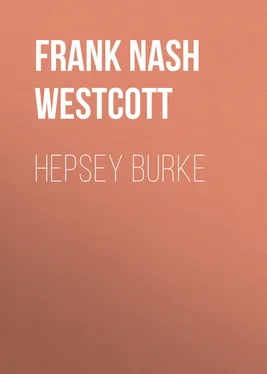Frank Nash Westcott - Hepsey Burke
Здесь есть возможность читать онлайн «Frank Nash Westcott - Hepsey Burke» — ознакомительный отрывок электронной книги совершенно бесплатно, а после прочтения отрывка купить полную версию. В некоторых случаях можно слушать аудио, скачать через торрент в формате fb2 и присутствует краткое содержание. Жанр: foreign_prose, foreign_antique, на английском языке. Описание произведения, (предисловие) а так же отзывы посетителей доступны на портале библиотеки ЛибКат.
- Название:Hepsey Burke
- Автор:
- Жанр:
- Год:неизвестен
- ISBN:нет данных
- Рейтинг книги:4 / 5. Голосов: 1
-
Избранное:Добавить в избранное
- Отзывы:
-
Ваша оценка:
- 80
- 1
- 2
- 3
- 4
- 5
Hepsey Burke: краткое содержание, описание и аннотация
Предлагаем к чтению аннотацию, описание, краткое содержание или предисловие (зависит от того, что написал сам автор книги «Hepsey Burke»). Если вы не нашли необходимую информацию о книге — напишите в комментариях, мы постараемся отыскать её.
Hepsey Burke — читать онлайн ознакомительный отрывок
Ниже представлен текст книги, разбитый по страницам. Система сохранения места последней прочитанной страницы, позволяет с удобством читать онлайн бесплатно книгу «Hepsey Burke», без необходимости каждый раз заново искать на чём Вы остановились. Поставьте закладку, и сможете в любой момент перейти на страницу, на которой закончили чтение.
Интервал:
Закладка:
“But don’t you believe in sending them useful things?” Virginia asked loftily.
“So I do; but I’d hate that word ‘useful’ if I was a missionary’s wife.”
“Might I inquire,” asked Miss Bascom meekly, “what you would send?”
“Certainly! I’d send a twenty-five-cent scent bag, made of silk and filled with patchouli-powder,” said Hepsey, squarely.
“Well,” Virginia added devoutly, “satchet bags may be well enough in their place; but they won’t feed missionaries, or clothe them, or save souls, you know, Mrs. Burke.”
“Did anybody say they would?” Mrs. Burke inquired. “I shouldn’t particularly care to see missionaries clothed in sachet bags myself; the smell might drive the heathen to desperation. But do we always limit our spending money to necessary clothes and 76 food? The truth is, we all of us spend anything we like as long as it goes on our backs, or down our throats; but the moment it comes to supportin’ missionaries we think ’em worldly and graspin’ if they show any ambition beyond second-hand clothes.”
“Do you live up to your preachin’, Mrs. Burke?” a little sallow-faced woman inquired from a dark corner of the room.
“Oh, no; it hits me just as hard as anybody else, as Martin Luther said. But I’ve got a proposition to make: if you’ll take these things you brought, back with you, and wear ’em for a week just as they are, and play you’re the missionaries, I’ll take back all I’ve said.”
As, however, there was no response to this challenge, the box was packed, and the cover nailed down.
(It is perhaps no proper part of this story to add, that its opening on the other side of the world was attended by the welcome and surprising fragrance of patchouli, emanating from a little silk sachet secreted among the more workaday gifts.)
The ladies then adjourned to the front piazza, where the supper was served.
When the dishes had been cleared away, the guests adjusted their chairs and assumed attitudes of expectant 77 attention while Virginia stood up and shyly unrolled her manuscript, with a placid, self-conscious smile on her countenance. She apologized for her youth and inexperience, with a moving glance towards her pastor, and then got down to business. She began with the original and striking remark that it was the chief glory and function of woman to be a home-maker. She continued with something to the effect that the woman who forms the character of her children in the sanctity of the home-life rules the destinies of the world. Then she made a fetching allusion to the “Mother of the Gracchi,” and said something about jewels. Nobody knew who the “Gracchi” were, but they supposed that they must be some relatives of Virginia’s who lived in Boston.
She asserted that the modern methods of bringing up children were all wrong. She drew a striking picture of the ideal home in which children always stood modestly and reverently by their parents’ chairs, consumed with anxiety to be of some service to their elders. They were always to be immaculately neat in their attire, and gentle in their ways. The use of slang was quite beneath them.
These ideal children were always to spend their evenings at home in the perusal of instructive books, and the pursuit of useful knowledge. Then, when 78 half-past seven arrived, they were to rise spontaneously and promptly, and bid their parents an affectionate good-night, and retire to their rooms, where, having said their prayers and recited the golden text, they were to get into bed.
Portions of Virginia’s essay were quite moving. Speaking of the rewards which good mothers reap, in the virtues and graces of their dutiful offspring, she said:
“What mother does not feel a thrill of exquisite rapture as she fondly gazes into the depths of her baby’s eyes and sees there the budding promise of glorious womanhood. What mother does not watch the development of her little son with wondering pride, as she notes his manly, simple ways, his gentle reverence, his tender, modest behavior. What mother–”
Here Virginia came to an abrupt stop, for there was a terrible racket somewhere overhead on the piazza roof; a rope was suddenly dropped over the edge of the eaves, and almost immediately a pair of very immodestly bare legs were lowered into view, followed by the rest of Nickey Burke’s person, attired in his nightshirt. It was the work of a moment for the nimble boy to slide down the rope onto the ground. But, as he landed on his feet, finding himself 79 in the august presence of the missionary circle, he remarked “Gee Whitaker bee’s wax!” and prudently took to his heels, and sped around the house as if he had been shot out of a gun.
Several segments of the circle giggled violently. The essayist, though very red, made a brave effort to ignore the highly indecorous interruption, and so continued with trembling tones:
“What more beautiful and touching thing is there, than the innocent, unsullied modesty of childhood? One might almost say–”
But she never said it, for here again she was forced to pause while another pair of immodest legs appeared over the eaves, much fatter and shorter than the preceding pair. These belonged to Nickey’s boon-companion, the gentle Oliver Wendell Jones. The rest of O. W. J. followed in due time; and, quite ignorant of what awaited him, he began his wriggling descent. Most unfortunately for him, the hem of his nightshirt caught on a large nail in the eaves of the roof; and after a frantic, fruitless, and fearful effort to disconnect himself, he hung suspended in the breeze for one awful moment, like a painted cherub on a Christmas tree, while his mother, recognizing her offspring, rose to go to his assistance.
Then there was a frantic yell, a terrible ripping 80 sound, and Oliver Wendell was seen to drop to the ground clad in the sleeves and the front breadth of his shirt, while the entire back of it, from the collar down, waved triumphantly aloft from the eaves. Oliver Wendell Jones picked himself up, unhurt, but much frightened, and very angry: presenting much the aspect of a punctured tire. Then suddenly discovering the proximity of the missionary circle and missing the rear elevation of his shirt about the same time, in the horror and mortification of the moment, he lost his head entirely. Notwithstanding the protests of his pursuing mother, without waiting for his clothes, he fled, “anywhere, anywhere out of the world,” bawling with wrath and chagrin.
The entire circumference of the missionary circle now burst into roars of laughter. His mother quickly overtook and captured Oliver, tying her apron around his neck as a concession to the popular prejudice against “the altogether.” The gravity of the missionary circle was so thoroughly demoralized that it was impossible to restore order; and Miss Bascom, in the excess of her mortification, stuffed the rest of her manuscript, its eloquent peroration undelivered, into her bag.
When the last guest had departed, Mrs. Burke proceeded to hunt up Nickey, who was dressed and sitting on the top of the corn-crib whittling a stick. His mother began:
“Nicholas Burke, what in the name of conscience does all this idiotic performance mean, I’d like to know?”
Nickey closed his knife. Gazing serenely down at his mother, he replied:
“How’d I know the blamed missionary push was goin’ to meet on the front porch, I’d like to know? Me and Oliver Wendell was just playin’ the house was on fire. We’d gone to bed in the front room, and then I told Ollie the fire was breakin’ out all around us, and the sparks was flyin’, and the stairs was burned away, and there was no way of ’scapin’ but to slide down the rope over the roof. I ’aint to blame for his nightshirt bein’ caught on a nail, and bein’ ripped off him. Maybe the ladies was awful shocked; but they laughed fit to split their sides just the same. Mr. Maxwell laughed louder than ’em all.”
Читать дальшеИнтервал:
Закладка:
Похожие книги на «Hepsey Burke»
Представляем Вашему вниманию похожие книги на «Hepsey Burke» списком для выбора. Мы отобрали схожую по названию и смыслу литературу в надежде предоставить читателям больше вариантов отыскать новые, интересные, ещё непрочитанные произведения.
Обсуждение, отзывы о книге «Hepsey Burke» и просто собственные мнения читателей. Оставьте ваши комментарии, напишите, что Вы думаете о произведении, его смысле или главных героях. Укажите что конкретно понравилось, а что нет, и почему Вы так считаете.












